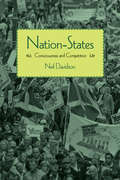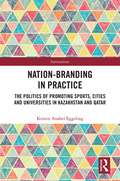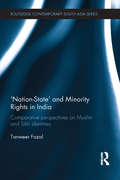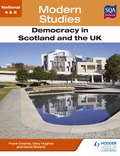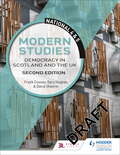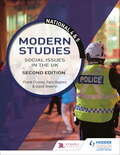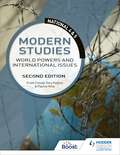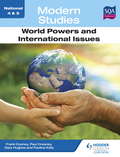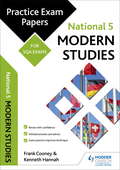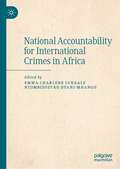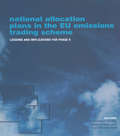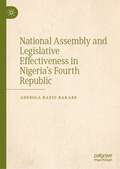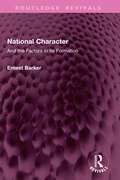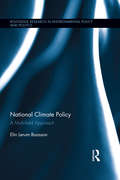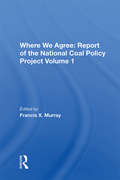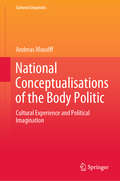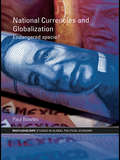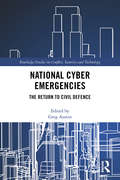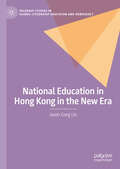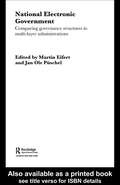- Table View
- List View
Nation-States: Consciousness and Competition
by Neil DavidsonIn his latest collection of essays, Neil Davidson brings his formidable analytical powers to bear on the concept of the capitalist nation-state. Through probing inquiry, Davidson draws out how nationalist ideology and consciousness is used to bind the subordinate classes to "the nation," while simultaneously using "the state" as a means of conducting geopolitical competition for capital.
Nation-branding in Practice: The Politics of Promoting Sports, Cities and Universities in Kazakhstan and Qatar (Interventions)
by Kristin Anabel EggelingThis book investigates the political implications of country promotion through practices of ‘nation-branding’ by drawing on contemporary examples from the sports, urban development and higher education sector in Kazakhstan and Qatar. Nation-branding has emerged as a central practice of international politics, where it is commonly understood as a vain, superficial selling technique with little political salience. Drawing on shared insights from practice theory and constructivist notions of nationalism, identity and power, this book challenges this reading and instead argues that nation-branding is neither neutral nor primarily economically motivated, but inherently politicised and tied to the legitimation of current political regimes. The starting point for the analysis is a range of everyday practices and sites long ignored by international relations scholars. In particular, the book traces how the political leadership in Kazakhstan and Qatar have used participation in the international sports circuit, spectacular urban development, and the construction of ‘world-class’ universities to first produce and then stabilize new ideas about their state. Providing a new analytical perspective on nation-branding, this book will be of interest to students and scholars of Middle Eastern and Central Asian studies, International Relations, and Cultural and Political Geography.
Nation-state and Minority Rights in India: Comparative Perspectives on Muslim and Sikh Identities (Routledge Contemporary South Asia Series)
by Tanweer FazalThe blood-laden birth-pangs of the Indian "nation-state" undoubtedly had a bearing on the contentious issue of group rights for cultural minorities. Indeed, the trajectory of the concept ‘minority rights’ evolved amidst multiple conceptualizations, political posturing and violent mobilizations and outbursts. Accommodating minority groups posed a predicament for the fledgling "nation-state" of post-colonial India. This book compares and contrasts Muslim and Sikh communities in pre- and post-Partition India. Mapping the evolving discourse on minority rights, the author looks at the overlaps between the Constitutional and the majoritarian discourse being articulated in the public sphere and poses questions about the guaranteeing of minority rights. The book suggests that through historical ruptures and breaks , communities oscillate between being minorities and nations. Combining archival material with ethnographic fieldwork, it studies the identity groups and their vexed relationship to the ideas of nation and nationalism. It captures meanings attributed to otherwise politically loaded concepts such as nation, nation-state and minority rights in the everyday world of Muslims and Sikhs and thus tries to make sense of the patterns of accommodation, adaptation and contestation in the life-world. Successfully confronting and illuminating the challenge of reconciling representation and equality both for groups and within groups, this exploration of South Asian nationalisms and communal relations will be of interest to academics in the field of South Asian Studies, in particular Sociology and Politics.
National 4 & 5 Modern Studies: Democracy in Scotland and the UK
by Gary Hughes Frank Cooney David SheerinThe complete resource for National 4 & 5 Modern Studies endorsed by SQA.National 4 & 5 Modern Studies titles from Hodder Gibson provide up-to-date resources for the Natioanl 4 & 5 syllabus outlines offered by the Scottish Qualifications Authority for examination from 2014 onwards. Democracy in Scotland and the UK analyses what it means to live in a democracy, representation in the Scottish and UK Parliaments, local goverment in Scotland, voting systems and election campaigns in the UK, thus ensuring that students are fully briefed on the relevant topic areas for exam preparation.
National 4 & 5 Modern Studies: Democracy in Scotland and the UK, Second Edition
by Gary Hughes Frank Cooney David SheerinExam Board: SQALevel: National 5Subject: Modern StudiesFirst Teaching: September 2017First Exam: Summer 2018This second edition comprehensively covers the changes made to course content and prepare students to cope with the increased emphasis on knowledge and understanding in the new National 5 exam.- Analyses what it means to live in a democracy - Defines representation in the Scottish and UK Parliaments- Explains voting systems and election campaigns in the UK
National 4 & 5 Modern Studies: Democracy in Scotland and the UK, Second Edition
by Gary Hughes Frank Cooney David SheerinExam Board: SQALevel: National 5Subject: Modern StudiesFirst Teaching: September 2017First Exam: Summer 2018This second edition comprehensively covers the changes made to course content and prepare students to cope with the increased emphasis on knowledge and understanding in the new National 5 exam.- Analyses what it means to live in a democracy - Defines representation in the Scottish and UK Parliaments- Explains voting systems and election campaigns in the UK
National 4 & 5 Modern Studies: Social Issues In The Uk: 2nd Ed Epub
by Gary Hughes Frank Cooney David SheerinExam Board: SQALevel: National 5Subject: Modern StudiesFirst Teaching: September 2017First Exam: Summer 2018This second edition comprehensively covers the changes made to the course content and prepares students to cope with the increased emphasis on knowledge and understanding in the new National 5 exam.- Covers the two issues that students have the opportunity to study in this unit of the course: Social Inequality and Crime and the Law- Monitors progress throughout the topics with summary questions- Focuses attention on specific topic areas with case studies and fact files - Prepares students for the final exam with assessment guidance
National 4 & 5 Modern Studies: Social issues in the UK, Second Edition
by Gary Hughes Frank Cooney David SheerinExam Board: SQALevel: National 5Subject: Modern StudiesFirst Teaching: September 2017First Exam: Summer 2018This second edition comprehensively covers the changes made to the course content and prepares students to cope with the increased emphasis on knowledge and understanding in the new National 5 exam.- Covers the two issues that students have the opportunity to study in this unit of the course: Social Inequality and Crime and the Law- Monitors progress throughout the topics with summary questions- Focuses attention on specific topic areas with case studies and fact files - Prepares students for the final exam with assessment guidance
National 4 & 5 Modern Studies: World Powers And Inter Issues 2nd Ed Epub N5mswor
by Gary Hughes Frank Cooney Pauline KellyExam Board: SQALevel: National 5Subject: Modern StudiesFirst Teaching: September 2017First Exam: Summer 2018This second edition comprehensively covers the changes made to the course content and prepares students to cope with the increased emphasis on knowledge and understanding in the new National 5 exam.- Analyses the USA, China and South Africa - Covers Development Issues in Africa and International Terrorism in depth
National 4 & 5 Modern Studies: World Powers and International Issues
by George Clarke Frank Cooney Pauline KellyThe complete resource for National 4 & 5 Modern Studies endorsed by SQA.National 4 & 5 Modern Studies titles from Hodder Gibson provide up-to-date resources for the National 4 &5 syllabus outlines offered by the Scottish Qualifications Authority for examination from 2014 onwards. World Powers and International Issues analyses the USA, China, Developing Issues in Africa, Security Issues of Western Countries and Economic Alliances, thus ensuring that students are fully briefed on the relevant topic areas for exam preparation.
National 4 & 5 Modern Studies: World Powers and International Issues, Second Edition
by Gary Hughes Frank Cooney Pauline KellyExam Board: SQALevel: National 5Subject: Modern StudiesFirst Teaching: September 2017First Exam: Summer 2018This second edition comprehensively covers the changes made to the course content and prepares students to cope with the increased emphasis on knowledge and understanding in the new National 5 exam.- Analyses the USA, China and South Africa - Covers Development Issues in Africa and International Terrorism in depth
National 5 Modern Studies: Practice Papers for SQA Exams
by Frank Cooney Kenneth HannahPractise for your SQA exams with three specially-commissioned Hodder Gibson Practice Exam Papers with fully-worked answers.- Practise with model papers written and checked by experienced markers and examiners- Worked answers show how answers are arrived at and where marks are gained- Get extra advice with study-skills guidance sections- Gain vital extra marks and avoid common mistakes with examiner tips- A revision grid allows revision by topic
National Accountability for International Crimes in Africa
by Emma Charlene Lubaale Ntombizozuko Dyani-MhangoThis book critically examines the issues pertaining to the Rome Statute’s complementarity principle. The focus lies on the primacy of African states to prosecute alleged perpetrators of international crimes in their respective jurisdictions. The chapters explore states’ international and domestic obligations to hold perpetrators of international crimes to account before the national courts, and demonstrate the complexity of enforcing national accountability of alleged perpetrators of international crimes while also ensuring that post-conflict African states achieve national healing, reconciliation, and sustainable peace. The contributions reject impunity for international crimes whilst also considering these complexities. Emphasis further lies on the meaning of accountability in the context of the politics of selective international criminal justice for crimes committed before the establishment of the International Criminal Court.
National Allocation Plans in the EU Emissions Trading Scheme: Lessons and Implications for Phase II (Climate Policy Series)
by Karsten Neuhoff Michael Grubb Regina BetzThe EU emissions trading scheme is the largest emissions control scheme in the world, capping almost half of European CO2 emissions. As the scheme emerges from its pilot phase, this special issue of Climate Policy journal analyses the lessons learned from the last two years and their implications for phase II. The volume presents some of the key analyses that helped inform the European Commission's decisions on national allocation plans, with research ranging from detailed country-by-country comparisons to more generic analysis that puts forward the case for harmonization. Challenging calls to seperate electricity from other sectors, a macroeconomic study suggests that the biggest efficiency gains come from inter-sectoral trading, even more than international trading. Empirical papers, which look at the expected scarcity of allowances in the market and merge models for the power and non-power sectors to project emissions and contrast these to the aggregate allocation volume, are complemented by two numerical simulations of trade and distributional effects, estimating the efficiency gains of the EU ETS in phase I and assessing allocation and distribution effects in the RGGI context.
National Assembly and Legislative Effectiveness in Nigeria’s Fourth Republic
by Adebola Rafiu BAKAREThis book evaluates the legislative effectiveness of Nigeria’s National Assembly under the Fourth Republic. The assessment covers five Assemblies (4th–8th) and focuses specifically on lawmaking, cost of running the National Assembly, and the budget making process. It empirically assesses the effectiveness of the Nigerian national legislature beyond previous emotional and sentimental evaluations of the institution. It has developed a model ‘Institutional Legislative Effectiveness Score’ used in assessing the institutional performance of the National Assembly from two perspectives: first, by comparing the performances of the two chambers in the same Assembly; and second, by comparing the performances of the institution across Assemblies. Aside lawmaking, the book also covers the major topical issues that characterized public evaluation of the institution. These include: size of the institution, budgeting process, cost of funding the institution, and the debate on the appropriate way in reforming the National Assembly.
National Belonging and Everyday Life
by Michael SkeyWhy do so many people take-for-granted the idea that they live in and belong to a nation? Do national identities matter and, if so, to whom? To what extent are processes of globalisation undermining or reinforcing attachments to the nation? Drawing on insights from sociology, social psychology and anthropology, Michael Skey addresses these complex questions by examining the views and attitudes of a group that has been overlooked in much of the recent literature; the ethnic majority. Through a detailed analysis of the ways in which members of the majority in England discuss their own attachments, their anxieties about the future, and, in particular, their relations with minority groups, Skey demonstrates the link between a more settled sense of national belonging and claims to key material and psycho-social resources. By analysing what is at stake for the majority, the book offers a more complete understanding of recent controversies over immigration, multiculturalism and community cohesion in Western settings, as well as a framework for theorising the significance of nationhood in the contemporary era.
National Character: And the Factors in its Formation (Routledge Revivals)
by Ernest BarkerFirst published in 1927, National Character is based upon a course of ten lectures on citizenship, delivered, under the terms of the Stevenson Foundation, in the University and the City of Glasgow during the latter part of 1925 and the beginning of 1926. The author argues that to see how nations have become what they are may be the best way of discovering how they can make themselves other than what they are.Divided into two parts-the material factors and the spiritual factors, the book discusses themes like race, territory and climate, population and occupation, growth of national spirit, law and government, influence of churches, role of literature and thought, and ideas and system of education to understand the factors behind the formation of national character. This is an important historical reference work for scholars and researchers of political studies and political philosophy.
National Cleansing: Retribution Against Nazi Collaborators in Postwar Czechoslovakia
by Benjamin FrommerNational Cleansing examines the prosecution of over one hundred thousand suspected war criminals and collaborators by Czech courts and tribunals after the Second World War. As the first comprehensive history of postwar Czech retribution, this 2005 book provides a new perspective on Czechoslovakia's transition from Nazi occupation to Stalinist rule in the turbulent decade from the Munich Pact of September 1938 to the Communist coup d'tat of February 1948. Based on archival sources that remained inaccessible during the Cold War, National Cleansing demonstrates the central role of retribution in the postwar power struggle and the contemporary expulsion of the Sudeten Germans. In contrast to general histories of postwar Czechoslovakia, which portray retribution as little more than Communist-inspired political justice, this book illustrates that the prosecution of collaborators and war criminals represented a genuine, if flawed, attempt to confront the crimes of the past, including those committed by the Czechs themselves.
National Climate Policy: A Multi-field Approach (Routledge Research in Environmental Policy and Politics)
by Elin Lerum BoassonFailed attempts at producing ambitious global climate commitments and instruments have made it increasingly important for nation states to deliver climate policies. This in turn requires a better understanding of national climate policymaking. In this book, Elin Lerum Boasson develops an innovative and well-grounded analytical framework for assessing national climate-policy development. Why do national climate policies emerge and change? This question is underpinned by the role played by different actors and the kind social mechanism at work. Boasson asks, to what extent and how is the emergence and change of climate policy influenced by: politicians and the national political fields; business and organizational fields; EU policy and the European environment; social and entrepreneurial mechanisms? Combining policy studies with sociological new institutionalism, and drawing on three climate policy sub-areas in Norway: renewable energy, low-energy buildings and carbon capture and storage, Boasson presents a multi-field framework that allows the reader to capture the entire policy cycle, explaining policy initiation, policy adoption and the long-term, social feedback effects resulting from implementation (or lack of implementation).
National Coal Policy Vol 1: Report Of The National Coal Policy Project
by Francis X. MurrayThe report of the National Coal Policy Project is entitled Where We Agree to focus attention on the broad areas of agreement reached by the project participants. This one-year project brought together leading individuals from environmental and industry groups to seek consensus on important national policy issues related to the use of coal in
National Conceptualisations of the Body Politic: Cultural Experience and Political Imagination (Cultural Linguistics)
by Andreas MusolffThis book presents the results of a large-scale experiment into interpretations of the metaphor “the Nation as a Body” among 1,800+ respondents from 30 linguistic and cultural backgrounds. In this first account of an empirical study of cross-cultural global metaphor interpretation of that scale, Musolff confirms that the meanings of metaphors are complex, culturally mediated and may differ for senders and recipients. The book provides a historical and cultural map of the traditions underlying differences in how the nation as a body – or, “the body politic” – is understood. Musolff challenges the hypotheses of the universality of “the nation” as a predominantly male-gendered and hierarchically organized concept and, in so doing, puts into question some of the key presuppositions of traditional historical and cognitive approaches to metaphor. For scholars and students of figurative language, the book lays out methodological foundations for cross-cultural metaphor comparison and reveals hidden meaning differences in political metaphor in English as lingua franca.
National Currencies and Globalization: Endangered Specie? (RIPE Series in Global Political Economy)
by Paul BowlesGlobalization and money – two concepts inextricably linked. In many ways the speed with which financial resources traverse the globe, the opportunities which this provides for the efficient allocation of resources, the possibilities which this creates for financial crises and traders who act as agents removed from the concerns of national citizens have come to symbolize the phenomenon, hopes and fears of ‘globalization’. However, inextricably linked they may be, but well understood they are not. In the case of national currencies, a wide variety of predictions and analyses can be found. For some, national currencies represent barriers to a seamless global economy. Others argue that national currencies will disappear due to the power of international financial markets which will force national governments to adopt more credible currencies and abandon their own. In contrast, others see imperialism or regionalism as the main challenges. Paul Bowles provides an innovative and systematic analysis of the implications of theories of globalization for national currencies. He critically examines whether, as a result, the world is heading for fewer currencies. He argues that the main ‘force of globalization’ which is endangering national currencies is that of globalization as ‘neoliberal globalism’. However there is no single neoliberal position on money and so the ‘contingent’ nature of neoliberalism explains why this particular force of globalization operates more strongly in some countries than others. This is demonstrated in case studies of four systemically significant currencies, namely, those of Australia, Canada, Mexico and Norway. National Currencies and Globalization will be of interest to researchers and students of International Political Economy, Politics, Economics and Finance.
National Cyber Emergencies: The Return to Civil Defence (Routledge Studies in Conflict, Security and Technology)
by Greg Austin OliverThis book documents and explains civil defence preparations for national cyber emergencies in conditions of both peace and war. The volume analyses the escalating sense of crisis around state-sponsored cyber attacks that has emerged since 2015, when the United States first declared a national emergency in cyberspace. It documents a shift in thinking in the USA, from cooperative resilience-oriented approaches at national level to more highly regulated, state-led civil defence initiatives. Although the American response has been mirrored in other countries, the shift is far from universal. Civil defence strategies have come into play but the global experience of that has not been consistent or even that successful. Containing contributions from well-placed scholars and practitioners, this volume reviews a selection of national experiences (from the USA, Australia, India, China, Estonia, and Finland) and a number of key thematic issues (information weapons, alliance coordination, and attack simulations). These demonstrate a disconnect between the deepening sense of vulnerability and the availability of viable solutions at the national level. Awareness of this gap may ultimately lead to more internationally oriented cooperation, but the trend for now appears to be more conflictual and rooted in a growing sense of insecurity. This book will be of much interest to students of cyber security, homeland security, disaster management, and international relations, as well as practitioners and policy-makers.
National Education in Hong Kong in the New Era (Palgrave Studies in Global Citizenship Education and Democracy)
by Jason Cong LinThis book provides a comprehensive, up-to-date picture of national education in Hong Kong. At the societal level, it offers an in-depth understanding of a divisive issue for Hongkongers, elaborating the official approach so that diverse stakeholders have a basis for re-evaluating the nature and implementation of national education for rational and critical dialogue. At the policy and curricular level, it offers evidence-based suggestions to foster inclusive and reflective decision-making and curriculum development related to national education. At a practical level it facilitates the teaching of national education in schools and helps diverse stakeholders to reflect on how national education relates to them, and what they can do to co-construct an inclusive and reflective national education. The book will interest researchers in multicultural education, national identity, identity politics and China and Hong Kong Studies.
National Electronic Government: Comparing Governance Structures in Multi-Layer Administrations (Routledge Research in Information Technology and Society)
by Martin Eifert Jan Ole PüschelThis volume presents a comparative study to evaluate the success of the implementation of e-government in the UK, US, France, Germany, Finland, Australia and Japan. The detailed study examines national e-government strategies and their institutional framework of coordination and cooperation by focusing on the relevant players, the interplay of administrative levels and the types of control used by them. Drawing on literature on comparative public administration and comparative law, this book makes an important contribution to our understanding of advanced e-government.
